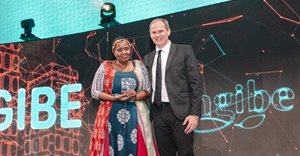Trending
#EntrepreneurMonth: The program that prepares youth with future-fit skills

We chat with Dieudonne Allo, founder of Global Leading Light Realities, to learn more about the programme and what motivated him to start it.
Can you tell us a bit about Global Leading Light Initiatives?
Global Leading Light Initiatives (GLLI) is a non-profit organisation based in Mthatha, Eastern Cape. It was created to increase opportunities for youths to develop their natural gifts and be part of the tech economy. Our aim is to establish an ecosystem of technology entrepreneurs and a pipeline for entry-level jobs in these communities.
When, how and why did you get started?
In 2013, I was a teacher at Lutoli JSS, a rural school around Mthatha. I saw lots of my students, though talented was classified as "students with learning disabilities". Some had amazing skills that counted for nothing in any academy subject. I had seen many such students repeat classes and dropping out, I then knew something else was possible – a space to develop personal talent and innovation over and above academics. This made me start a student club called “Leading Light Club”.
I believed that every human being had a beam of "light" in them, otherwise called a unique talent or gift, which if given the right space and support, would shine and be a source of light for their communities.
The Leading Light Club was a school club which coached students to develop their natural gifts. In 2015, it was registered as a non-profit organisation, providing space for creativity and innovation in youths and communities. Parent and teacher clubs called "Iziko" provided teachers and coaching skills to parents and teachers to coach young persons to develop their gifts. Iziko was piloted in Cato Manor in KwaZulu-Natal, Gaborone in Botswana and Mthatha in 2015 and 2016.
The Leading Light Clubs were piloted in six high schools in Mthatha and Walter Sisulu University in 2017 and 2018. We spent the last three years working in Mthatha to find out the community’s needs and iterating our model. This led to the current technology and entrepreneurship model called the “Community Innovation Lab”.
What is the core function of the Global Leading Light Initiatives?
We have two main programmes serving students and unemployed youths. Our school programme provides digital, design thinking and entrepreneurial leadership skills with the intention to spark students’ interest in innovation, technology and entrepreneurship. Our community programme, called the “LL-Tech Academy”, provides hands-on training in digital engineering, electronic waste recycling and entrepreneurship as well as business incubation and acceleration to school drop-outs, high school leaders and unemployed graduates around Mthatha.
What are some of the obstacles you've had to overcome since starting out?
A major obstacle has always been a lack of funding. Fortunately, I have been lucky to have some strong support from many community members, some of who have been working passionately with me for years as volunteers with no stipend.
The challenge of working with volunteers is the fact that they often leave having been trained, with all the experience as soon as a better financial opportunity shows up. I try to keep them motivated through a community-driven and collaborative leadership approach.
Another obstacle was that of lack of skills. I spent the past years developing my project management skills through a number of national and international fellowship programmes such as the StarttingBloc Fellowship, the Goldin Institute, Foundation for Professional Development, and Echoing Green Fellowship where I have been a semi-finalist for two consecutive years and the Red Bull Amaphiko Academy.
Through these programmes, I have honed my entrepreneurship and leadership skills and feel very confident to drive grassroots impact entrepreneurship.
What advice would you give to other aspiring entrepreneurs?
There is a lot to say here, but the most important advice I would give any aspiring entrepreneur is to know your "why" before venturing on this journey. You need to ask yourself the right questions to know what your motivation is. Because this is what will empower you to overcome adversity. I will also advise them to build their competence by doing some short courses to develop the skills required to run a successful business. There are many free resources and courses online.
My last piece of advice is to get a mentor. I didn’t realise how important coaching and mentorship is for an entrepreneur until I joined the Red Bull Amaphiko Academy. I now believe that having someone to support you in your journey and to who you are accountable is one of the most important things for an entrepreneur.
What has been your proudest achievement thus far?
This is a tough one, as I have so many proud achievements worthy of mentioning here. However, I feel like mentioning my appointment into the United Nations Selections Committee for the Solutions Summit in 2018 and 2019.
I took part in the selection of the 10 best global projects addressing the UN SDGs and was an acceleration partner to some of these projects during the summit at the UN headquarters in New York during the last UNGA. I feel it was a recognition of the impact created through my work and leadership. This made me really proud, especially looking at where I come from.
What does the future of entrepreneurship look like to you?
Entrepreneurship is one of the oldest careers and won’t be going anywhere soon. Many innovations are springing up daily in townships, cities and even rural areas. The Government of South Africa and some other development agencies are doing a good job in supporting these innovations to grow into successful entrepreneurial ventures. However, despite this, only an estimated 15% of tech start-ups in South Africa are making a profit. This means more has to be done in terms of skills development and funding.
What do you think is the importance of programmes such as Red Bull Amaphiko?
Red Bull Amaphiko is the best entrepreneurship incubator I know of in South Africa. They really give entrepreneurs wings to fly. Mentorship is one of the most important needs of an entrepreneur, and Red Bull Amaphiko provides that in a very practical way. They also put the entrepreneur at the centre of the intervention. There is a need for many such programmes to grow the entrepreneurship ecosystem in the country. I have already benefitted enormously from their support.
What would you like to see changed in the South African startup landscape?
More support for grassroots and rural entrepreneurship. There is a need for rural tech entrepreneurship support. To stop poverty, tech entrepreneurship needs to be more inclusive.
 What do you believe are the traits an entrepreneur needs in order to succeed?
What do you believe are the traits an entrepreneur needs in order to succeed?- Passion: The passion one has for his/her business can determine the success or failure of that business. Passion provides the motivation to keep moving even when things don’t seem to go well.
- Resilience: Most entrepreneurs, including myself, fail a number of times before getting it right. Most even lose money. The entrepreneur’s ability to start all over is very important.
- Creativity: New ideas lead to innovation which is key in entrepreneurship, especially in the tech entrepreneurship space. To be a successful entrepreneur, one has to think out of the box.
Start with what you have. As an entrepreneur, there is no doubt that we need money to make money. However, I have learned that the most important asset of a start-up entrepreneur is the people in his/her community. We can start by identifying people with certain strengths and leveraging on these strengths to start building our businesses before thinking of funding from somewhere.
Some may be able to provide skills, some may make in-kind donations, and others may volunteer their time, while others may just give useful feedback. Some might even help connect you to potential donors.
Tell us about your biggest struggles as an entrepreneur, as well as some major highlights.
My biggest struggle so far has been to obtain training space and financial resources to extend the impact of our programme to many deserving youths. Out of 233 youths who applied to be in our academy this year, we were only able to recruit six due to our limited resources.
We found that there is a niche for rural and township tech innovation and entrepreneurship around Mthatha and rural surrounding communities, but the support system isn’t strong enough. We are struggling to get the resources we need to set up a technology innovation and entrepreneurship support programme to serve unemployed youths and students, who we realised by working with them over the years possess a huge potential for tech innovation.
Over the years we have collaborated with the Walter Sisulu University, IDC, Cisco, Goldin Institute and Agape Werks in Chicago, USA and learned from well-established incubators nationally and internationally and have developed a model that is capable of disrupting poverty through grassroots tech entrepreneurship. But we need support to make this happen.
Our organisation has achieved tremendous outcomes in the past two years. So far we have supported the creation of five youth-owned tech businesses in Mthatha. Most of these youths joined the academy with no IT skills but today they are cisco and CompTIA certified IT technicians running their own businesses.
Some are already making a living out of their businesses. In our School Innovation programme, one of our participants in grade 12 from under-resourced school has invented a game which is helping students boost their performance in economics and inspiring student entrepreneurship. These are some of our major highlights.
Would you encourage someone to become an entrepreneur? Why?
I would definitely encourage anyone to become an entrepreneur. I believe anyone can be if we do some personal development work to start with. As an entrepreneur, you can be your own boss and live your purpose.
 Where would you like to see GLLI in the next five years?
Where would you like to see GLLI in the next five years?I would like to see GLLI running grassroots innovation Hubs in at least three communities in South Africa, each with a well-equipped IT engineering lab, prototype lab and STEM lab as well as a business incubation space.


















